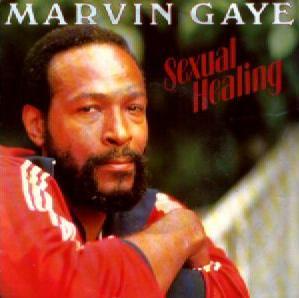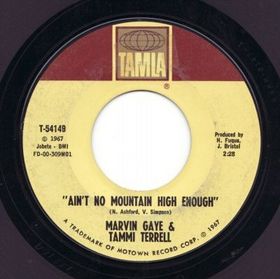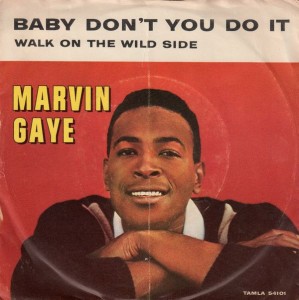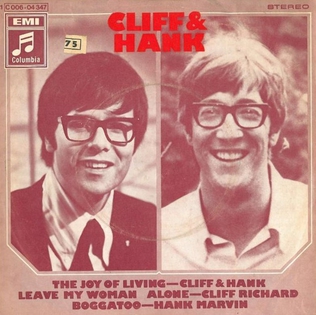Scandal'us were the winners of the Australian Popstars 2 in 2001. They won an ARIA chart award for their No. 1 debut single "Me, Myself & I". Their second and final single, "Make Me Crazy", only reached No. 30. Their debut album, Startin' Somethin', debuted and peaked at No. 2 on the ARIA Albums Chart. The group disbanded in 2002.

"I Heard It Through the Grapevine" is a song written by Norman Whitfield and Barrett Strong for Motown Records in 1966. The first recording of the song to be released was produced by Whitfield for Gladys Knight & the Pips and released as a single in September 1967. It went to number one on the Billboard R&B Singles chart and number two on the Billboard Pop Singles chart and shortly became the biggest selling Motown single up to that time.

Frente! is an Australian folk-pop and indie pop group which originally formed in 1989. The original line-up consisted of Simon Austin on guitar and backing vocals, Angie Hart on lead vocals, Tim O'Connor on bass guitar, and Mark Picton on drums.

"What's Going On" is a song by American singer-songwriter Marvin Gaye, released in 1971 on the Motown subsidiary Tamla. Originally inspired by a police brutality incident witnessed by Renaldo "Obie" Benson, the song was composed by Benson, Al Cleveland, and Gaye and produced by Gaye himself. The song marked Gaye's departure from the Motown Sound towards more personal material. Later topping the Hot Soul Singles chart for five weeks and crossing over to number two on the Billboard Hot 100, it would sell over two million copies, becoming Gaye's second-most successful Motown song to date. It was ranked at number 4 in Rolling Stone's 500 Greatest Songs of all Time in 2004 and 2010.

"Sexual Healing" is a song recorded by American singer Marvin Gaye from his seventeenth and final studio album, Midnight Love (1982). It was his first single since his exit from his long-term record label Motown earlier in the year, following the release of the In Our Lifetime (1981) album the previous year. It peaked at No. 3 on the Billboard Hot 100 and is listed at number 198 on Rolling Stone's list of 500 Greatest Songs of All Time. "Sexual Healing" is written and composed in the key of E-flat major and is set in time signature of 4/4 with a tempo of 94 beats per minute.

"Got to Give It Up" is a song by American music artist Marvin Gaye. Written by the singer and produced by Art Stewart as a response to a request from Gaye's record label that he perform disco music, it was released in March 1977.

"Let's Get It On" is a song by soul musician Marvin Gaye, released June 15, 1973, on Motown-subsidiary label Tamla Records. The song was recorded on March 22, 1973, at Hitsville West in Los Angeles, California. The song features romantic and sexual lyricism and funk instrumentation by The Funk Brothers. The title track of Gaye's album of the same name, it was written by Marvin Gaye and producer Ed Townsend. "Let's Get It On" became Gaye's most successful single for Motown and one of his most well-known songs. With the help of the song's sexually explicit content, "Let's Get It On" helped give Gaye a reputation as a sex symbol during its initial popularity. "Let's Get It On" is written and composed in the key of E-flat major and is set in time signature of common time with a tempo of 82 beats per minute.

"Ain't No Mountain High Enough" is a song written by Nickolas Ashford & Valerie Simpson in 1966 for the Tamla label, a division of Motown. The composition was first successful as a 1967 hit single recorded by Marvin Gaye and Tammi Terrell, and became a hit again in 1970 when recorded by former Supremes frontwoman Diana Ross. The song became Ross's first solo number-one hit on the Billboard Hot 100 chart and was nominated for the Grammy Award for Best Female Pop Vocal Performance.

"I Want You" is a song written by songwriters Leon Ware and Arthur "T-Boy" Ross and performed by singer Marvin Gaye. It was released as a single in 1976 on his fourteenth studio album of the same name on the Tamla label. The song introduced a change in musical styles for Gaye, who before then had been recording songs with a funk edge. Songs such as this gave him a disco audience thanks to Ware, who produced the song alongside Gaye.

"You're All I Need to Get By" is a song recorded by the American R&B/soul duo Marvin Gaye and Tammi Terrell and released on Motown Records' Tamla label in 1968. It was the basis for the 1995 single "I'll Be There for You/You're All I Need to Get By" from Method Man and Mary J. Blige.

"Pride and Joy" is a 1963 single by Marvin Gaye, released on the Tamla label. The single, co-written by William "Mickey" Stevenson, Gaye and Norman Whitfield, and produced by Stevenson, was considered to be a tribute to Gaye's then-girlfriend, Anna Gordy. The album version of the single featured on Gaye's second album, That Stubborn Kinda Fellow is different in parts to the single version presenting a more jazz effect than the gospel-emulated version that became a single. The song was also Gaye's first top ten pop single peaking at number ten on the chart and just missed the top spot of the R&B singles chart peaking at number two. The song also helped continue Gaye's successful hit streak as the singer would score another Top 40 pop hit at the end of that year with "Can I Get a Witness".
"It Takes Two" is a hit single recorded in late 1965 by Marvin Gaye and Kim Weston for Motown's Tamla label.

The Shadows were an English instrumental rock group, who dominated the British popular music charts in the late 1950s and early 1960s, in the pre-Beatles era. They served as the backing band for Cliff Richard from 1958 to 1968, and have joined him for several reunion tours.

"Baby Don't You Do It" is a 1964 single by American singer Marvin Gaye. Released on the Tamla label, this song discusses a man who is at a standstill with his girlfriend, who he feels is neglecting his love stating "Don't break my heart/...I've tried to do my best".

"Living Doll" is a song written by Lionel Bart made popular by Cliff Richard and the Shadows in 1959. It was the top selling single in the UK in 1959. It has topped the UK charts twice: in its original version in 1959 and a new version recorded in 1986 in aid of Comic Relief. It is one of the few songs released by an English singer to chart on the American Billboard charts before the British Invasion occurred.
"The End of Our Road" is a single written by Roger Penzabene, Norman Whitfield and Barrett Strong in 1967. Originally recorded by Gladys Knight & the Pips and issued as a single in 1968, the Pips' version of the song, became another top forty hit for the family group as it peaked at number fifteen on the pop singles chart and number five on the R&B singles chart.
"California Soul" is a funk-soul tune written by Ashford & Simpson, issued originally as the B-side of the Messengers' single "Window Shopping" in 1967 under the Motown group of labels.

Marvin Richard James Humes is an English singer, disc jockey, television presenter and radio host who previously presented the Monday–Thursday late-night show across the Capital Network. He previously hosted The Official Big Top 40 chart show across UK commercial radio stations on a Sunday afternoon, between 2013 and 2018.

Staying at Tamara's is the second studio album by English singer-songwriter George Ezra. It was released on 23 March 2018. The album reached number one in the UK as well as the top ten of several other countries including Australia and New Zealand. The album includes the singles "Paradise" and "Shotgun", which peaked at number two and number one on the UK Singles Chart, respectively.

"The Joy of Living" is a song by British singers Cliff Richard and Hank Marvin released as a single in February 1970. It peaked at number 25 on the UK Singles Chart.














